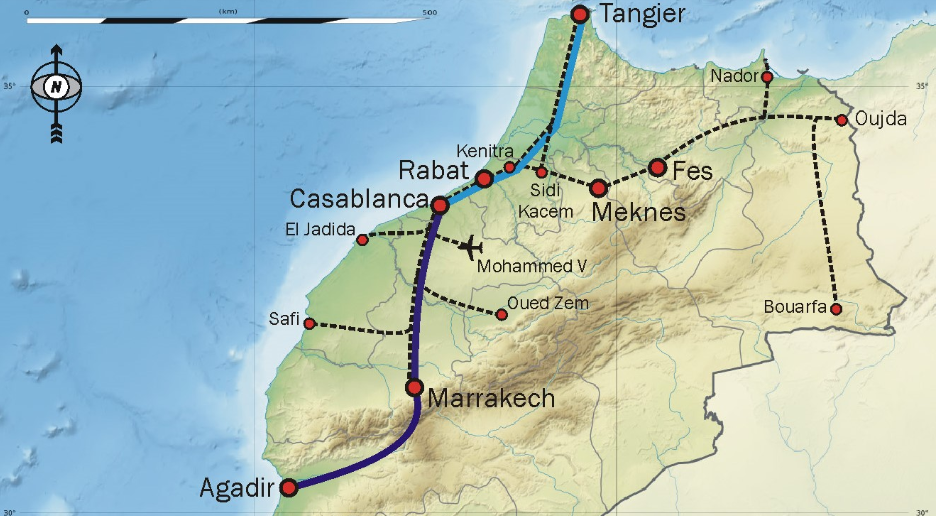
Morocco has taken another bold step in modernizing its transportation infrastructure by appointing a Chinese firm to spearhead the next phase of its high-speed rail (HSR) network. This landmark development underscores the North African nation’s commitment to positioning itself as a continental leader in connectivity and infrastructure.
The Moroccan government, through the national railway operator ONCF (Office National des Chemins de Fer), has officially awarded the high-speed rail contract to [insert Chinese firm’s name]. This partnership will focus on extending Morocco’s successful high-speed rail network, which began with the Tangier-Casablanca line, launched in 2018.
The project, known as the TGV Al Boraq extension, will connect key cities and regions, bolstering economic activity and reducing travel times significantly. The new line is expected to link Casablanca to Agadir, a bustling coastal city and a critical economic hub.
The Chinese firm will oversee the design, construction, and partial funding of the project. With expertise in high-speed rail development, the company is set to provide state-of-the-art technology, ensuring the line adheres to international standards for efficiency, safety, and sustainability.
The contract includes provisions for technology transfer, enabling Moroccan engineers and technicians to gain skills in advanced rail systems. This aspect is critical as Morocco seeks to build local capacity and reduce reliance on foreign expertise for future projects. The expansion of Morocco’s high-speed rail network is expected to yield significant economic and social benefits:
Boosting Economic Growth: By connecting major economic centers, the project will facilitate trade and commerce, attract foreign investment, and promote tourism. Agadir, in particular, stands to gain as faster connectivity could spur its development as a regional business and leisure hub.
Job Creation: The construction phase alone is projected to create thousands of jobs, both directly and indirectly. Local industries, including construction and manufacturing, will benefit from the demand for materials and services. Environmental Benefits: High-speed rail is a greener alternative to road and air travel. The new line is expected to reduce Morocco’s carbon footprint by encouraging a shift to rail transport for passengers and freight.
Improved Accessibility: The HSR extension will improve mobility for millions of Moroccans, making travel faster, safer, and more affordable. This accessibility is vital for fostering social inclusion and regional equity.
This deal highlights the deepening economic and diplomatic ties between Morocco and China. Both countries have been strategic partners in recent years, with China investing heavily in Moroccan infrastructure, including ports, highways, and renewable energy projects.
The high-speed rail project is a flagship initiative within the framework of China’s Belt and Road Initiative (BRI), which aims to enhance connectivity and trade across Africa, Asia, and Europe. For Morocco, participation in the BRI aligns with its ambitions to become a key gateway for Africa.
While the project is promising, challenges remain. Funding and logistical complexities, such as land acquisition and environmental clearances, could pose hurdles. However, with Morocco’s track record of completing large-scale infrastructure projects, including the initial high-speed rail line, confidence remains high.
ONCF has assured the public of its commitment to transparency and timely execution. The government also plans to engage stakeholders, including local communities, to ensure the project aligns with broader development goals.
The appointment of a Chinese firm to develop Morocco’s high-speed rail network marks a significant milestone in the nation’s journey toward modernization and economic transformation. By investing in cutting-edge infrastructure, Morocco is not only enhancing connectivity within its borders but also solidifying its position as a key player in Africa’s economic integration and global trade networks.
As the project unfolds, it promises to redefine travel and commerce in Morocco, bridging regions and creating opportunities for generations to come.


